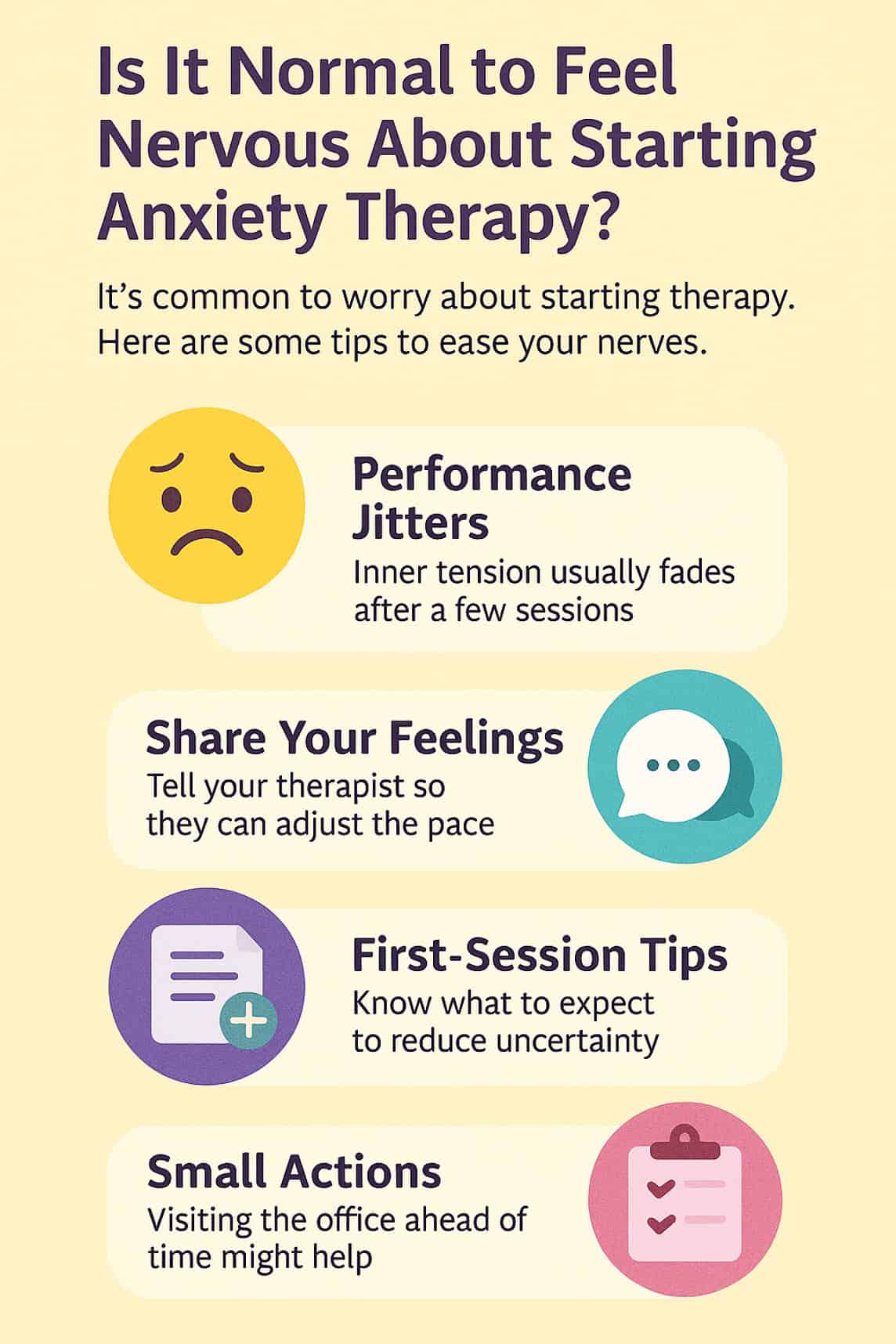
Key Takeaways for Feeling Nervous About Starting Anxiety Therapy.
- Feeling anxious before starting anxiety therapy is extremely common and totally okay
- That nervous energy often fades after one or two sessions
- Telling your therapist about your pre-session jitters helps them tailor the experience
- Doing small things like visiting the office ahead of time or preparing questions can ease first-time nerves
- You will always start with gentle steps like check-ins, goal setting, and learning calming skills
🎯 Feeling nervous about starting anxiety therapy is completely normal, and taking that first step is often the strongest move you’ll make toward lasting calm.
👉 Ready to take the next step? Learn more about anxiety therapy at AERCS and how to book your free 15-minute phone consultation.

It is completely normal to feel nervous or anxious when starting anxiety therapy; in fact, most new clients report a flutter of worry before their first appointment, and that discomfort usually fades within the first few sessions as you learn what to expect and begin practising simple coping skills.
Why Pre-Session Jitters Happen.
Your Brain Loves Familiarity.
When you walk into a therapist’s office, you leave your comfort zone. The brain’s alarm system, the amygdala, fires off a threat detected signal, even if therapy is a safe space.
Fear of Judgement.
Many people worry about being “analysed” or saying the wrong thing. Remember, therapists are trained to listen without criticism and to meet you exactly where you are.
Change Feels Risky.
Starting anxiety therapy means facing thoughts and feelings you may have avoided. Feeling uneasy is simply a sign that you are stepping toward growth.
What to Expect in Your First Few Sessions.
| Session Stage | What Happens | Why It Eases Anxiety |
|---|---|---|
| Check-In | Brief chat about your week | Builds rapport |
| Agenda Setting | You and your therapist choose a focus | Gives structure |
| Skills Review | Discuss homework or coping tools | Tracks progress |
| New Material | Learn a fresh technique, like grounding | Adds confidence |
| Homework & Coping Plan | Agree on a simple task for the week | Keeps you safe between visits |
Knowing this flow ahead of time can lower those first-session nerves.
Practical Tips to Calm First-Day Anxiety.
- Arrive Ten Minutes Early:
Sit in the waiting area, breathe slowly, and let your body adjust. - Plan a Buffer Activity Afterward:
Schedule a short walk or calming playlist so your brain can process the session. - Write Down Three Main Concerns:
Bring a notepad or phone list so you are not scrambling for words. - Share Your Nervousness:
Saying, “I feel anxious about being here,” gives your therapist valuable information to adjust pace and style. - Visit the Office or Virtual Platform in Advance:
A quick test run removes the stress of logistics.
How Therapists Help You Settle In.
- Pacing: They may start with lighter topics before diving deeper.
- Validation: Therapists normalise your fears, showing other clients feel the same.
- Skill Preview: Expect a simple breathing or grounding exercise on day one.
- Flexibility: If sudden addiction triggers or worries arise, the plan can pivot.
Each of these actions reduces performance anxiety and builds trust.
Common Myths That Fuel First-Session Fear.
| Myth | Reality |
|---|---|
| “The therapist will stare silently.” | Most sessions are collaborative and conversational. |
| “I have to reveal everything at once.” | You control what and when you share. |
| “If I cry, it means I’m weak.” | Tears are a normal release and accepted in therapy. |
Debunking these myths can lower the stakes of showing up.
When Nervousness Signals Something More.
If anxiety spikes to panic level every time therapy day rolls around:
- Check for Underlying Trauma: Extreme fear may relate to past experiences.
- Discuss Treatment Options: Combining therapy with medication can help if anxiety blocks participation.
- Try Gradual Exposure: Start with shorter sessions or audio calls before full video or in-person meetings.
Early transparency helps your therapist tailor support quickly.
Feeling Jittery About Starting Anxiety Therapy is Common and Temporary.
Understanding the session structure, preparing simple notes, and sharing your nervousness openly turn those first-day butterflies into the first step toward calm.
Ready to make that step? Visit our Anxiety Therapy page and book your free 15-minute phone consultation. We’ll set a pace that feels right for you.
Is it common to feel scared when starting anxiety therapy?
Yes, most people feel uneasy before the first session, and the feeling fades as sessions become routine.
How long do nerves last after starting anxiety therapy?
Many clients report calmer feelings by the third or fourth session once they know the process.
Should I tell my therapist that I am nervous about starting anxiety therapy?
Absolutely, sharing this helps the therapist adjust pacing and reassure you.
Can preparing notes help when starting anxiety therapy?
Yes, jotting down concerns or questions can make the first session smoother and reduce anxiety.
What if my anxiety feels too high to begin therapy?
Discuss alternatives like shorter sessions, phone calls, or adding medication while you get comfortable starting anxiety therapy.
Do You Need Anxiety Therapy?
Take this quick self-assessment to see if anxiety therapy could help you manage symptoms.Note: This questionnaire is educational only and does not replace a clinical assessment. If you wish to obtain professional guidance, please follow up with a licensed mental health professional.

